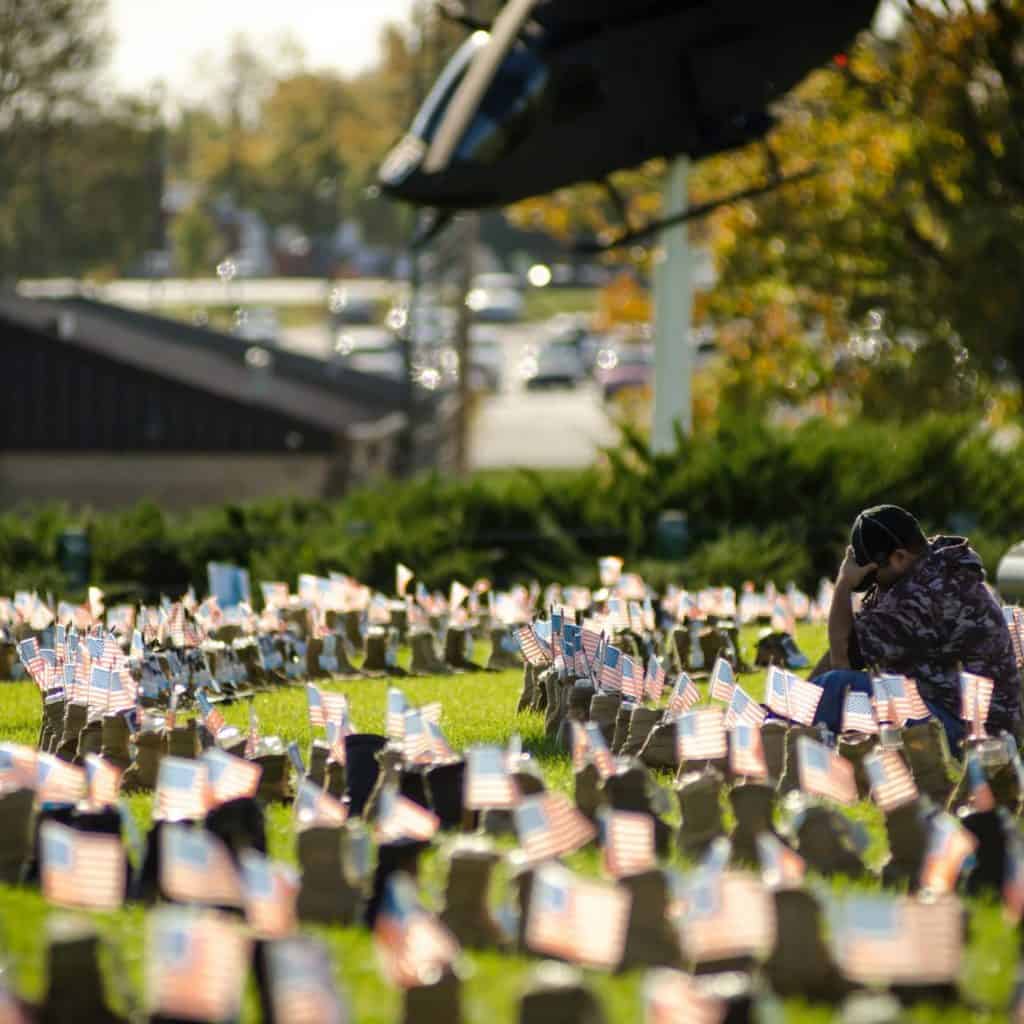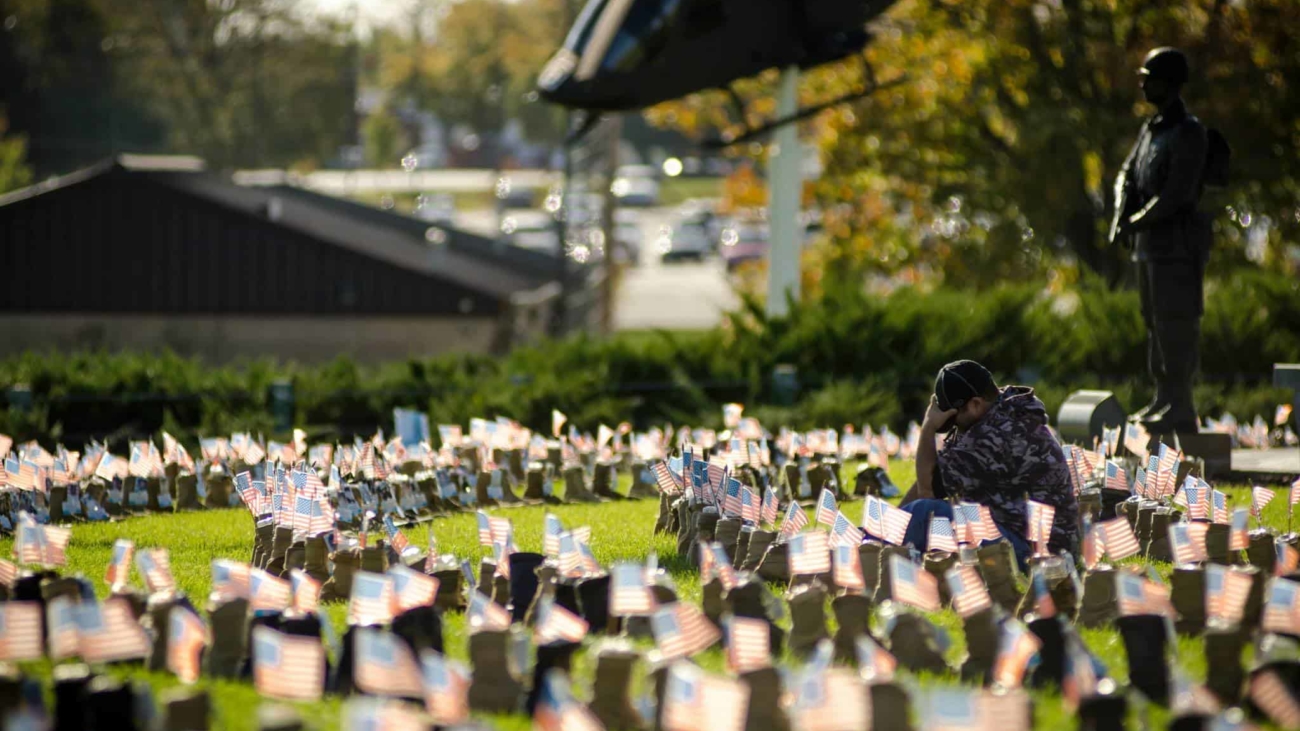By- Dr. Aimee Vaughn LPCC-S
Many of you know that I have spent the last year and change researching moral injury in veterans and the impact of learning about moral injury on clinicians who work with veterans. Today I want to start by just introducing the concept of moral injury to those who may not be familiar.
What is Moral Injury and how is it different than PTSD?
Most people are familiar with the term Posttraumatic Stress Disorder (PTSD), especially in relation to combat veterans. PTSD is when a person has experienced or witnessed a traumatic event AND then has symptoms such as intrusive thoughts about the traumatic event, avoiding situations that remind them of the event, hyperarousal, and negative or counterproductive thoughts about themselves or the world, lasting longer than a month (APA, 2013). The symptoms of PTSD are fear responses to traumatic memories. Operation Iraqi and Enduring freedom veterans are twice as likely (14%) to experience PTSD than their civilian counterparts (7%) (Tanielian, & Jaycox, 2008; Kessler et al., 2005). Researchers have been working hard to develop and improve current PTSD treatment for veterans with a fair amount of success. However, many veterans, two thirds according to Steenkamp et al. (2015), still meet the PTSD diagnosis criteria after being treated with frontline treatments such as Prolonged Exposure, Cognitive Processing Therapy, and EMDR. So, what are we missing?
It is possible that the problem, or part of the problem, may be some veterans experiencing moral injury. Moral injury is what happens when a person engages in or fails to prevent something that goes against deeply held beliefs and values (Litz et al., 2009). It does not matter if it was part of their job, if they had to do it to save their own lives, or they were commanded to do it, the veterans experience deep guilt and shame about what has transpired. Some examples include killing, torture, damage of property or failing to prevent others from harming people or property. Additionally, moral injury can include instances where a person experienced betrayal from leadership or was the betrayer of others (Shay, 2014). Without being able to process those experiences and separate the events from who they are as a person or make amends in some way, it can cause some serious symptoms such as spiritual concerns, loss of trust of self (Jinkerson, 2016), issues related to meaning of life, depressive symptoms, anxiety symptoms, reexperiencing, avoidance (Jinkerson & Battles, 2019), poor physical health (Yan, 2016), social isolation and interpersonal issues (Litz et al., 2009; Shay, 2014).
So what? You should feel guilty when you do something wrong
Yes, the average person does feel guilt and/or shame when they do something wrong. Usually that guilt or shame will help them realize that they should not do that thing again and possibly try to fix the wrong they have committed. Moral injury is something that is far more severe. Sure, most of us have done a few things that continue to randomly pop into our heads at night when we are trying to sleep, causing negative feelings. Moral injury does not allow the person to compartmentalize the event to “I did something wrong”, instead the person sees themselves or the world as bad and unworthy. They may feel so much guilt and shame that they isolate themselves from those they love because they believe they are unworthy or they fear what the person might think of them if they knew what kind of person they were and what they had done.
Do standard PTSD treatments for Moral Injury?
This is a tough one and the jury is still out. Some of the current PTSD treatments are manualized and so have little room for deviation. Further, it is possible that a clinician might treat moral injury as a cognitive distortion, or inaccurate view of the themselves or what happened, which is really may not be appropriate. A key to working with moral injury is allowing the client to choose what is a true violation of right and wrong. If a person believes it is wrong to take a life, and they took a life, no matter what the circumstances, then according to that person’s values, they did wrong. Instead of fighting that and saying that anyone would have done that in that situation, a clinician must allow the client to then make meaning of that experience and find a way to move forward by either seeking forgiveness, making amends, doing an act of service, or whatever is deemed appropriate by the client and counselor.
That being said, it is possible for a veteran to experience PTSD and moral injury at the same time, and so in this case it would be important to address both the PTSD and moral injury. There are treatment interventions that are currently being developed to specifically do this called Impact of Killing and Adaptive Disclosure.
Do people other than Vets experience Moral Injury?
They certainly do. I have worked with those in the medical field who care for the sick and dying who report having done things as directed by superiors that they did not feel was what the client wanted and caused suffering. Many case-workers are put into no-win situations where they are trying to make the best choices on the behalf of children, only to find out the child is in a worse situation. Those in civil service often have to bring harm to others in order to do their jobs, and while it is part of the job, there are those that suffer greatly for having harmed another or failed to prevent harm. These are just some jobs in which moral injury occurs, but the list is not exclusive.
What do I do if I or someone I know is suffering from Moral Injury?
Secret suffering only gets worse with time. The best thing you can do is talk about it with someone you trust. Maybe it is a family member, a friend, a counselor, or a spiritual adviser, but holding the pain inside you and suffering alone will not make things better. If you are supporting a person experiencing moral injury, be sure to let them know that you accept them just as they are. If you choose to seek professional help, you can ask your therapist if they have any training in moral injury or specifically search for those who do.
If you have any questions, feel free to message me at Guidestar Counseling and Consulting on facebook or www.guidestarcounseling.com
Be well friends.
References:
American Psychiatric Association. (2013). Diagnostic and statistical manual of mental disorders, (5th ed.). Washington, DC: Author.
Finlay, L. D. (2015). Evidence-based trauma treatment: Problems with a cognitive reappraisal of guilt. Journal of Theoretical and Philosophical Psychology, 35(4), 220–229. https://doi.org/10.1037/teo0000021
Jinkerson, J. D. (2016). Defining and assessing moral injury: A syndrome perspective. Traumatology, 22(2), 122–130. https://doi.org/10.1037/trm0000069
Jinkerson, J. D., & Battles, A. R. (2019). Relationships between moral injury syndrome model variables in combat veterans. Traumatology. https://doi.org/10.1037/trm0000163
Kessler, R.C., Berglund, P., Delmer, O., Jin, R., Merikangas, K.R., & Walters, E.E. (2005). Lifetime prevalence and age-of-onset distributions of DSM-IV disorders in the National Comorbidity Survey Replication. Archives of General Psychiatry, 62(6), 593-602.
Litz, B. T., Stein, N., Delaney, E., Lebowitz, L., Nash, W. P., Silva, C., & Maguen, S. (2009). Moral injury and moral repair in war veterans: A preliminary model and intervention strategy. Clinical Psychology Review, 29(8), 695-706. doi:10.1016/j.cpr.2009.07.003
Shay, J. (2014). Moral injury. Psychoanalytic Psychology, 31(2), 182-191. doi:10.1037/a0036090
Steenkamp, M. M., Litz, B. T., Hoge, C. W., & Marmar, C. R. (2015). Psychotherapy for military-related PTSD: A review of randomized clinical trials. JAMA: Journal of the American Medical Association, 314(5), 489–500. https://doiorg.ezproxy.lib.apsu.edu/10.1001/jama.2015.8370
Yan, G. W. (2016). The invisible wound: Moral injury and its impact on the health of Operation Enduring Freedom/Operation Iraqi Freedom veterans. Military Medicine, 181(5), 451-458. doi:10.7205/MILMED-D-15-00103
Yan, G. W. (2016). The invisible wound: Moral injury and its impact on the health of Operation Enduring Freedom/Operation Iraqi Freedom veterans. Military Medicine, 181(5), 451-458. doi:10.7205/MILMED-D-15-00103



